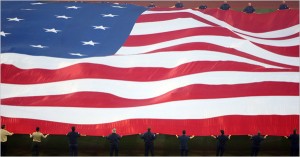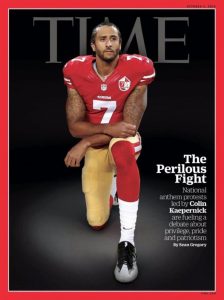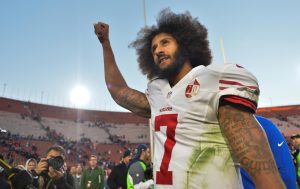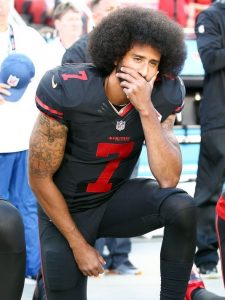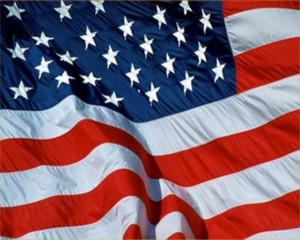By Frankie Wallace
Image Source: Pexels
In February, eight basketball players from the University of Mississippi knelt during the national anthem in order to protest two confederate sympathizer groups who had gathered on their college campus. The hate groups’ rallies were formed in support of a sculpture of a confederate soldier on the school’s campus. Regardless, the Ole Miss players’ silent protest stirred up some controversy around the sports media world.
One pleasantly surprising thing about this Ole Miss protest, in particular, was the support of the local community and college. As reported by ESPN:
The fact a kneel drew national attention is not new. What was unexpected: the public support from officials of a university that has been steeped in its own ugly history with racism. Even more of a surprise: the support from the town has sparked hope that the players’ actions will create more dialogue and tangible change around race relations and the Confederate iconography that is still a visible part of Oxford’s history.
This level of support for a protest is uncommon. They typically stoke the flames and cause many to ask: Should athletes be allowed to protest? While sports leagues and organizations often have the official say, the principle of the matter is still disagreed upon across the board. So on the question of principle, should the powers that be allow players to kneel during the national anthem?
Why We Stand vs. Why Some Kneel
When former San Francisco 49ers player Colin Kaepernick first sat out during the Star-Spangled Banner in 2016, there was an enormous amount of backlash. Since then, athletes like the Ole Miss players have been more commonly kneeling or sitting out as a means of protest. Critics often accuse protesters of disrespecting the United States military or the country as a whole.
That said, there is a general misunderstanding regarding why Kaepernick and many others protest. Most commonly, the reason has been racial injustice. In Kaepernick’s case, it was police brutality and structural racism against African Americans. This has continued to be the case for many athletes who sit or kneel during the anthem.
Those who object to these athletes’ actions often claim that by disrespecting the flag, the kneelers are actually disrespecting the military servicemen and women who have fought and died for American freedom. This understanding is reasonable but misguided. The flag and our national anthem do not exist purely to honor the military, but the institution of the United States as a whole.
To protest the flag is not to protest the military or even American values; it’s to call attention to situations in which American powers have failed to respect individuals. So kneeling during the National Anthem as an act of protest does not single out our Armed Forces.
“I Don’t Watch to Hear About Your Political Views”
Another common deflection deployed by angry sports fans during a game is that they’re paying to get in and see a game, not hear about someone’s political views. For the most part, this claim seems to be inconsistent, though. The same complaint doesn’t come up when the military or police officers promote themselves through halftime events or during the Pledge of Allegiance.
Rather, the people who say athletes should stay out of politics seem to speak up when they disagree with the person protesting. When former MLB player Johnny Damon argued that we should all stand for the anthem, for example, this complaint did not arise with the same fervor.
But players kneeling during a game to share their political views — something that is 100 percent legal to do in public — is not disrupting, slowing down, or changing the game. These players aren’t paid to stand for the anthem. Rather, they are there to play a sport, and each one of them is an individual with his or her personal views that they should be free to share.
Despite the backlash, there is a large amount of sports fans who are privy to racial injustice issues or are at least willing to change and learn. The fact that cases like Kaepernick’s or Ole Miss’ even made news headlines shows that these players are accomplishing what they set out to do by bringing attention to racial injustice. If a sports fan wants to stand in support of a player, they should.
How Athletes May Be Supported
However the media tries to spin it, racial injustice is still an issue. According to the NCAA, 16 percent of student athletes in 2018 were black, and another 20 percent were non-white, which means that a large amount of the athlete population is directly affected by racial inequality. In supporting protests, sports fans have a place to support these athletes where they may not otherwise find it.
As young people who have to deal with the very real dangers of racial injustice, the support Ole Miss’ community offered was invaluable, and other Universities could learn a lot from it. Professors and coaches on college campuses also need to know how to address and engage with social issues appropriately, especially in cases like February’s Ole Miss protest. Additionally, institutions of higher education should help show their support in these times by ensuring that their counselors are aware of how they can best counsel minority students amid racial unrest.
It doesn’t stop at the University level, though. On a professional level as well, striving for a diverse player roster and staff will bring more attention to race-related issues and could encourage understanding among white players and staff members whom racial injustice does not directly affect. In doing so, athletic administrations may create a culture of dialogue that can appreciate diverse perspectives, developing an open and welcoming environment for their athletes.
Should They Be Allowed to Protest?
To answer the question phrased at the beginning of this article: Yes, players should be allowed to kneel and protest. They are not dishonoring the military, and the issues they are protesting are important. To not allow them to protest would be to take away their voices as individuals who have something important to say.
That said, let’s support them! How do you show support to your favorite athletes in situations like this? Let us know in the comments below!

